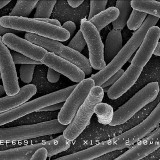
I just finished writing an article for Urban Farm Magazine on the subject of aerated compost tea (ACT for short). It proved to be one of the most contentious subjects on which I’ve ever tried to, as Mark Twain liked to say, “corral the truth.”
It got me thinking about other controversial soil additives popular in organic gardening and farming circles right now such as rock dust, mycorrhizae additives, and biochar.

Now I prefer not to touch these topics with a hundred foot pole. But let me go out on a limb with a thoughtstyling outside of the usual debate about the benefits or worthlessness of these soil potions. I’ve started wondering if the strong anecdotal evidence supporting things like ACT, biochar etc., might indicate a kind of ecological placebo effect at work.
Note: I’m not saying that placebos have no value or that, “It’s all in your head.” Quite to the contrary: the placebo effect is powerful and causes real changes in the physical world. Even hardcore skeptics agree with me on this (note also the downside to placebos in that article). As the fifteenth century alchemist Paracelsus said, “You must know that the will is a powerful adjuvant of medicine.”
So could working with these soil additives be a way of focusing human will, of changing human consciousness towards the goal of healing the damage to nature that we’ve caused? And what about biodynamics? I suspect a consciousnesses shift within human hearts and minds is what Rudolf Steiner was really trying to do with his, admittedly bizarre, preparations.
On the opposite, non-interventionist side of the gardening spectrum, I’ve been re-reading Masanobu Fukuoka’s books. Fukuoka advocates a radical, almost (but not entirely) hands-off approach to natural systems. Paradoxically, Fukuoka was striving for the very same shift in consciousnesses, though by entirely different (Eastern) means. As he put it, “The ultimate goal of farming is not the growing of crops, but the cultivation and perfection of human beings.”
I think we would do well to spend more time investigating the intersection of human consciousness and ecology in the years ahead. Our survival may depend on it.
Now, as Marshall McLuhan was fond of saying, “If you don’t like that idea, I’ve got others.” So let me know what you think in the comments . . .





There is a true and deep connection between feeding the soil and the soil feeding us. I have been caring for my little piece of desert for over 14 years, loads of homemade compost and earthworm castings. I can stick a garden fork in it after a nice rain to turn the soil, and the fragrance that that rises from that soil is pure heaven to me and that is conveyed to all of the greens, root veggies and fruits of the plants that it feeds, it’s all a placebo and that’s alright!
I’ve often wondered if foliar feeding really helps to increase crop yields. I know that leaves transpire, but do they really osmose?
I do know that I sprayed the leaves of a small dogwood I purchased years ago. Every day it got some sweet talk and a good spritzing of fertilizer on its leaves. It grew so that my friend marvelled, asking me how I got it to grow so fast.
The tomato plants that had fertilizer on the leaves grew faster than the almost neglected ones. The ones near the door received more attention than the few that were too far from the path to the back door. Of course, it could be they have different micro-climates. I always spray fertilizer the leaves of fruiting plants and even my basil.
I believe.
I think this “human will directly changing the world” is a crazy idea for crazy people. But if you want to go down that road you might want to check out the second half of The Secret Life of Plants by Peter Tompkins and Christopher Bird which explores all kinds of modern agricultural magic that got great results. The rest of the book is really good too.
>this “human will directly changing the world” is a crazy idea
Who said anything about “directly”?
The kind of magic you would see in a Disney cartoon isn’t something a sane person would expect to work in the real world, but the kind of magic Disney practices on its customer base has a strong influence on the real world, mediated by perfectly ordinary and common-sense mechanisms such as consumer choice and norms of social behavior.
There are people who practice magic and don’t seem to contemplate how changes of consciousness might influence more concrete planes of existence, but as soon as a group decides to problematize that connection and starts to look into it, things start sounding a lot more sane. I’m told that what a psychologist might call “magical thinking” is, from the perspective of actual magical thinking, known as “confoudning the planes” and gets similar recognition as a source of confusion and bad decision-making.
John Micheal Greer has written extensively about popular misunderstandings of magic–the “confounding the planes” you mentioned. To see real magic in action one need look no further than advertising. This is what Ioan P. Culianu wrote about in a book called Eros and Magic in the Renaissance. Greer calls advertising thaumaturgy–the use of symbolism, imagery etc. to manipulate people. It is to be distinguished from “theurgy” or divine magic. Fukuoka has a kind of Eastern take on theurgy–working with natural systems rather than trying to impose human will. In Greer’s definition, you can be either a religious person or an atheist and still either fall into the trap of thaumaturgy or, hopefully, work theurgically. To read more on these distinctions, see Greer’s post: http://thearchdruidreport.blogspot.com/2011/10/plutos-republic.html
This post strongly reminded me of John Michael Greer’s writing from last year about thaumaturgy.
I agree. I believe that a large part of our relationship with nurturing the soil and growing good things with it depends on the intersection of human consciousness and nature. What we believe about ourselves and about the earth will dramatically affect how we treat the earth. A look at how industrialized society has treated the earth thus far says a lot about the state of human consciousness.
I appreciate your treatment of these topics, Erik.
My own assumption has always been that the deepest intention of biodynamics was to establish a spiritual connection to the earth/ecology more than to create a set of guidelines to follow for growing crops successfully. In my opinion, intentions are powerful tools of the consciousness and quite possibly, just the act of putting your intentions behind something may just give it a little extra momentum.
Biochar seems like sound science to me (surface area and such). Rock dust I’m a litte more skeptical about